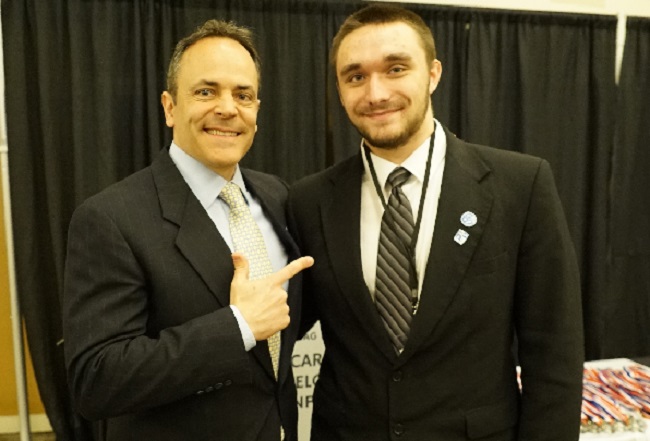Last year, the Department for Local Government helped five economically distressed Eastern Kentucky counties secure $219,400 in Appalachian Regional Commission funds to expand the JAG program. Among them was Clay County, where approximately one in 10 students are experiencing homelessness, according to data from the Kentucky Department of Education.

Governor Matt Bevin and Elijah Durham, a Clay County High School student who is involved with the Jobs for America's Graduates (JAG) program.
When Elijah Durham was in 8th grade, he would often leave his Thursday night football games covered in muck, and, without a shower or a post-game meal, he’d sleep on a park bench in Mount Vernon. Sometimes, he’d show up to school the next day, legs still coated in dried mud.
After a year of homelessness, Elijah entered the foster care system. Authorities went looking for him after he missed the first two weeks of his freshman year.
“I didn’t go to school for the first two weeks because I was embarrassed,” the now 16-year-old said. “I didn’t have clothes… because I had been homeless for a while.”
He had no idea at the time how much he’d accomplish in just a few years.
“I won state championships in powerlifting. I’m the captain of the football team, and I just now got a job,” he said, adding that the thing that made it possible was a program called Jobs for America’s Graduates, or JAG.
Elijah, a junior at Clay County High School, introduced Gov. Matt Bevin during Friday’s JAG Kentucky Career Development Conference. The event brought together roughly 150 students from across the Commonwealth to sharpen leadership and job skills, as well as celebrate the success they’ve found despite incredible odds.
Gov. Bevin shared with the students how he was able to overcome personal hardship through work and determination, and he challenged the students to seize opportunities in the JAG program.
“If a kid like me, who grew up like I did, can accomplish some of what I have been able to accomplish…there is nothing that is impossible,” he said. “Don’t be afraid of anything, and especially do not be afraid of failure. Be bold. When an opportunity comes your way, reach out and seize it. Dream big dreams, take what you have been given and trust your instinct.”

Last year, the Department for Local Government helped five economically distressed Eastern Kentucky counties secure $219,400 in Appalachian Regional Commission funds to expand the JAG program. Among them was Clay County, where approximately one in 10 students are experiencing homelessness, according to data from the Kentucky Department of Education.
“It’s gratifying and inspiring to hear that those ARC funds are helping students like Elijah find success both in and out of the classroom,” Department for Local Government Commissioner Sandra Dunahoo said. “These students have the potential to be tomorrow’s workforce leaders, which is why programs like JAG are so important.”
JAG KY, an affiliate of the national JAG program, gives at-risk students – many of whom are academically low-performing or from economically disadvantaged homes – the support they need to graduate and the skills they need to transition into a post-secondary opportunity. In JAG, students learn basic job skills and find the confidence they need to succeed after high school.
For the past two years, the JAG KY graduation rate has been 100 percent, with 97 percent of students enjoying a positive post-graduation outcome – full-time employment, post-secondary education, military, or a combination thereof – a year after high school graduation.
“It’s not just a drop-out prevention program by any means,” said Bill Crockett, who teaches JAG KY at Clay County Area Technology Center and freshman English at Clay County High. Rather, he said, JAG is all about empowering students.
Crockett has taught JAG for 25 years, but the success of the program became especially evident to him after meeting Elijah.
During his freshman year, Elijah would sit in Crockett’s English class, quiet and disinterested. Elijah ended up failing the class, but Crockett saw something in him.
So, Crockett asked him: What’s going on? Why are you not trying? I know you’re smarter than this.
Elijah remembers these interactions with Crockett well.
After all, they led him to the JAG program.
“When I first came in, I was like, ‘What am I doing here? There’s no purpose for even trying,’” Elijah said. “I was just so mad at the world, and he’s the one that showed me through JAG that I could do something. It made me feel like somebody.”
His sophomore year, Elijah worked hard and decided to retake the English one class. At the same time, he became more involved in JAG.
Elijah became the club’s historian. He joined his JAG classmates to buy Christmas presents for local kids, and he went to Washington, D.C., to attend the national JAG leadership conference. Now, he’s president of JAG at the Clay County Area Technology Center.
Elijah has also learned through JAG how to create strong first impressions during job interviews. In fact, he recently applied these skills to earn a part-time job at the local Save-A-Lot as a stock boy. It’s a job that Crockett recommended him for, even though JAG doesn’t usually help students find employment opportunities until their senior year. He felt that Elijah was ready.
Elijah sees his new job as “another stepping stone” in his life. After graduation, he plans to attend Eastern Kentucky University and study criminal justice. He wants to be a state trooper, and he feels optimistic about what’s to come.
Thanks to JAG, he said, he’s no longer doubts himself and what he’s able to accomplish.









